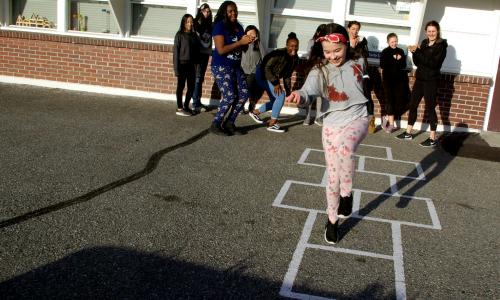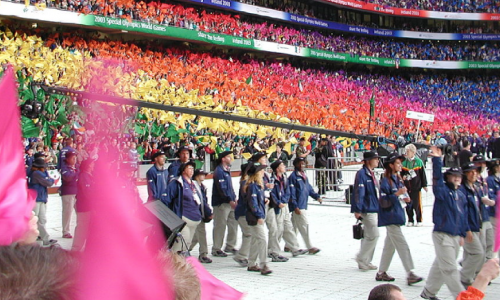
School, work, home. That’s considered the typical routine of a young adult – they go to school for higher education, work to stay in school, and relax at home. If only life were as simple as that. In between the school, work, home, is the possibility of drama. Situations that one would think solely exist in “Days of Our Lives”, can also occur anytime and anywhere.
Drama in the form of harassment and discrimination is a reality for many people including students. Can you recognize harassment and discrimination? Most instances of harassment occur through miscommunication; either the complainant has not expressed that the behaviour is unwanted or has misunderstood the situation.
You Decide
Do you think that the following scenario is considered harassment or discrimination?
There are two female applicants for the position of Retail Sales Manager at Holt Renfrew. Both are approximately equal as to experience and education. One is a former model and the other is very unattractive and overweight. If Holts hires the attractive woman because of her appearance, have they committed an act of illegal discrimination against the other woman?
Answer: No, Holts is not discriminating because appearance doesn’t fall under the definition of discrimination according to the policy.
In some instances, one would believe whole-heartedly that they are being harassed, while other times, many don’t realize they are in trouble until it is too late. This harassment is beyond television drama, but becomes a sad reality.
Here are a few examples of how a misunderstanding or miscommunication can result in a possibility of harassment or discrimination:
Scenario #1
Students lack clear communication whether he/she is or isn’t interested in dating others; but if that student doesn’t express his/her feelings, the other person may persist with phone calls or try to maintain a connection. In this case, the student must politely say “no”, in order to prevent a misunderstanding. If you do not clearly communicate, the perseverance may develop into harassment, even though that person didn’t realize that their advances were unwanted.
Scenario #2
A manager doesn’t feel that the employee is demonstrating productivity. As a result, the employee thinks they are being harassed because they are given a negative evaluation. In this situation, the employer’s actions aren’t considered harassment or discrimination, even though no attempt was made by the employee to clarify the problem.
Harassment and discrimination can occur during a work term outside of SFU. Unfortunately in this case, SFU doesn’t have jurisdiction over this situation. Here are a few suggestions of what can be done:
-
Try and get yourself out of that position.
-
Talk to your SFU Coordinator to discuss your options in such a situation.
-
Complain to BC Human Rights Tribunal, who is responsible for accepting, screening, mediating and adjudicating human rights complaints.
In another situation, a girl was being harassed by a man from a different office/company. Although this doesn’t fall under the company’s jurisdiction, the only thing you can do is ask the employer to help put a stop to it, even if this person was a customer.
These are definitions that you need to know from SFU’s Human Right’s Policy 18:
-
Discrimination: Intentional or unintentional differential treatment for which there is no bona fide or reasonable justification. Such discrimination imposes burdens, obligations or disadvantages on specific individuals or groups as defied by human rights legislation.
-
Harassment: Using the reasonable person standard, persistent, specifically directed behaviour which the person knows or ought to know is unwanted or unwelcome, which creates a hostile work or leaning environment.
-
The grounds of discrimination prohibited by the Human Rights Code are: age (19 years or more and less than 65 years), race, colour, ancestry, place of origin, political belief, religion, marital status, family status, physical or mental disability, sex, sexual orientation, and, in the case of employment, unrelated criminal convictions. (Policy 18)
How to Get Help
If you feel that you may be the victim of harassment or discrimination, ensure that the act or behaviour falls under the policy’s definition provided above. If you strongly believe that it is harassment or discrimination, the problem can be taken to SFU’s Human Rights & Equity Office. These are basic steps of what will occur in such a situation:
Make an appointment with the SFU Human Right’s Office.
-
Describe what happened
-
Ensure that both parties are part of SFU and that it is under the same jurisdiction.
-
If you are being harassed outside the SFU community, the problem may be taken provincially or federally.
-
-
Does the situation fit description and definition in SFU’s Policy?
-
You will be asked what you want to do about the situation.
-
Typically, they will advise the respondent to stop.
-
It is best to send an e-mail to request no further contact with the respondent.
-
This e-mail then becomes evidence that a situation existed and it was unwanted.
-
-
If you request the issue to be mediated, Brenda Taylor, Director of SFU’s Human Rights Office, will identify the problem and the people involved.
It is important to recognize whether one is being harassed or discriminated. Take the time to read SFU’s Human Rights Policy 18 and become more conscious of situations that can occur at school or in a work environment. Don’t be the next harassment and discrimination police and obsess over the possibility that it may occur; simply be aware and enjoy life as it is!
Beyond the Blog
-
For more information on this topic, visit the SFU Human Rights Office Homepage.
-
If you feel like researching a little on your own, read the SFU Human Rights Policy to get you started.












